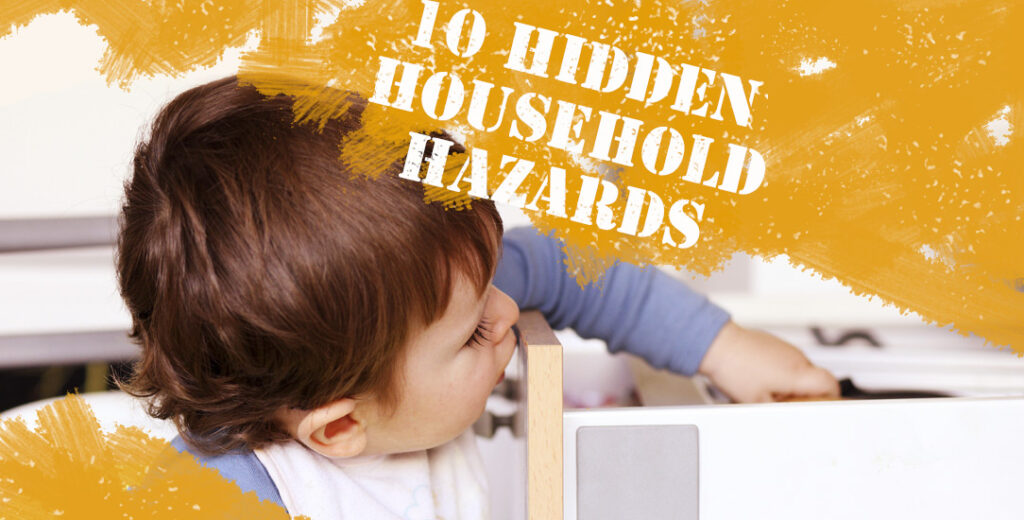As parents, we always try to create a safe and comfortable environment for our children. However, many everyday items and situations in our homes can pose hidden hazards to our little ones. In this article, we will discuss the top ten hidden household hazards for children and provide tips on how to prevent accidents.

Poisonous Substances
Household cleaners, medications, and personal care products such as mouthwash, hand sanitizers, and perfumes can contain dangerous chemicals that can cause poisoning. Keep all these items out of reach of children, preferably in a locked cabinet. Always read labels and follow instructions when using these products.
If you suspect poisoning,
call Poison Help at 1-800-222-1222
Choking Hazards
Small items such as coins, toys, and food can pose choking hazards to young children. Keep small objects away from children under three years old. Cut food into small pieces, and supervise children while eating.
Electrical Outlets and Cords
Electrical outlets and cords can be tempting for little fingers. Cover all unused outlets with outlet covers, and use cord holders to secure cords out of reach of children. Teach children not to touch cords or electrical outlets.
Falling Objects
Furniture, appliances, and other heavy objects can pose a risk of falling on children. Secure bookshelves, dressers, and televisions to the wall to prevent them from tipping over. Keep heavy items on lower shelves or in drawers.
Burns
Hot liquids and foods, as well as hot appliances such as ovens and irons, can cause burns to young children. Use back burners and turn pot handles away from the front of the stove. Keep hot appliances out of reach of children.
Suffocation Hazards
Plastic bags, pillows, and stuffed animals can pose a risk of suffocation to young children. Keep plastic bags out of reach and store them safely. Avoid using pillows and stuffed animals in cribs and other sleep areas.
Sharp Objects
Sharp objects such as knives, scissors, and tools can cause injuries to children. Keep all sharp objects locked away in a drawer or cabinet. Store power tools and gardening equipment in a locked shed or garage.
Water Hazards
Water can be dangerous for children. Always supervise children while they are in or around water, including swimming pools, bathtubs, and buckets. Empty all buckets and other containers of water after use.
Window Falls
Open windows can pose a risk of falls for young children. Keep all windows closed and locked when children are around. Install window guards or stops on all windows, especially on upper floors.
Furniture and Appliance Entrapment
Fingers and limbs can get trapped in furniture and appliances such as doors and drawers. Install safety latches and locks on cabinets, drawers, and appliances. Teach children not to climb or play on furniture.
In conclusion, our homes are full of hidden hazards for children. It is our responsibility as parents to identify these hazards and take appropriate measures to prevent accidents. By taking simple steps such as securing furniture, locking away dangerous substances, and supervising children around water, we can create a safer environment for our little ones.
FAQs
The most common household hazard for children is falling objects such as furniture and appliances.
Household cleaners, medications, and personal care products such as mouthwash, hand sanitizers, and perfumes can contain dangerous chemicals that can cause poisoning.
You can prevent choking hazards by keeping small objects out of reach of children under three years old and supervising children while eating.
If your child ingests a poisonous substance, call poison control immediately and follow their instructions. Seek medical attention if necessary.
No, window guards cannot be removed easily in case of an emergency. However, they are designed to release quickly in case of a fire or other emergency situation.
